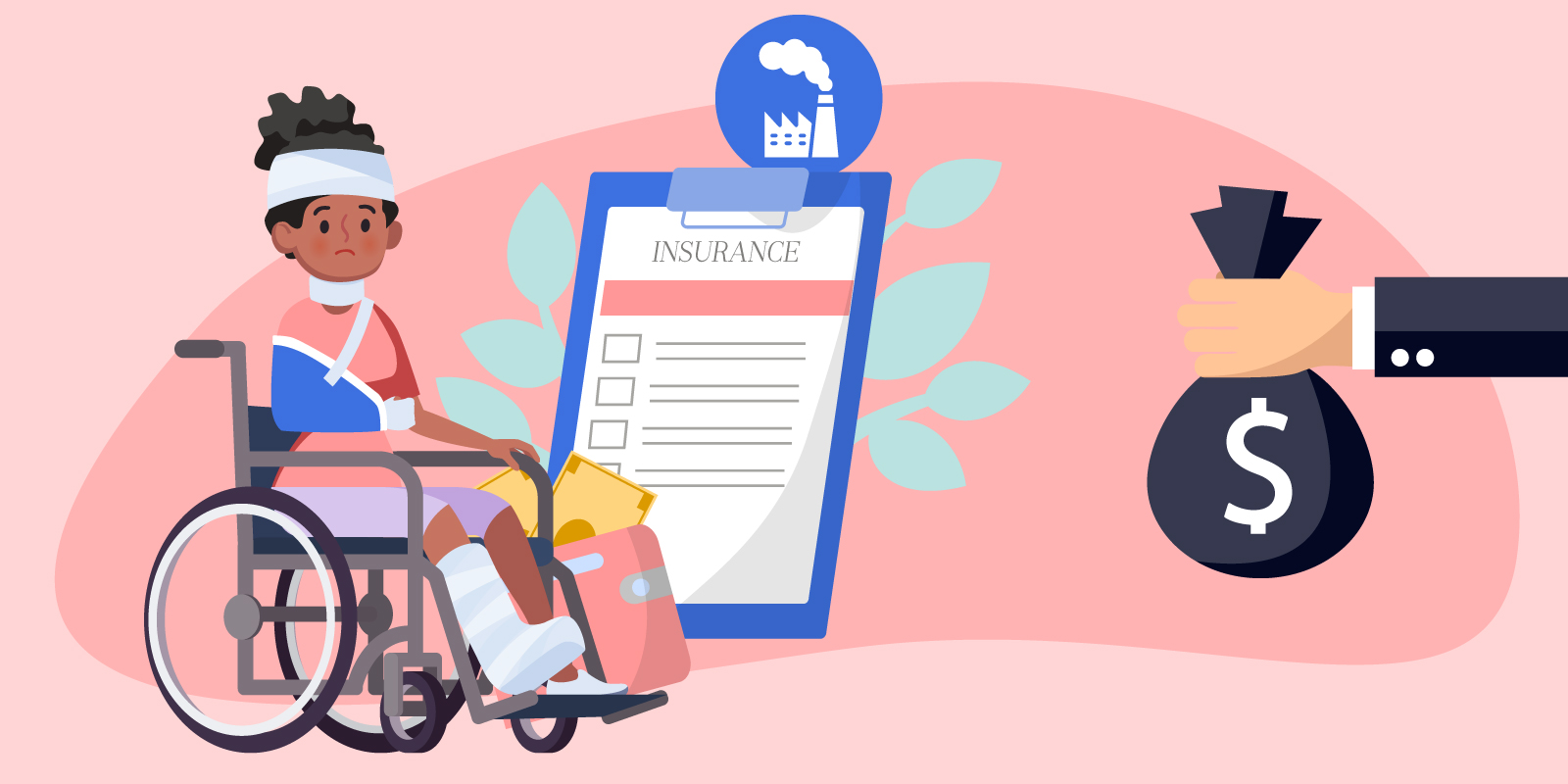Disability insurance is an important safety net for those who are unable to work due to injury or illness. It provides financial protection and can help replace lost income. Your policy can even cover student loan payments while you are out of work!
This type of insurance is often overlooked, but it is important to understand what it covers and how it works in order to make sure you are adequately protected.
What Is Disability Insurance?
Disability insurance is a type of insurance policy that provides financial security to those who cannot work because of an illness or injury. The purpose of disability insurance is to provide a source of income for people who are not able to work due to their disability, allowing them to maintain some level of financial stability while they focus on getting better.
Types of Disability Insurance
There are three general types of disability insurance. While many people are familiar with government-sponsored disability insurance policies through the Social Security Administration, these policies are also available through the private sector.
Coverage is sometimes included in employer benefits, with employees paying part or all of the premium. However, individual policies are also available if your work does not provide coverage.
Regardless of how you go about getting coverage, there are two major divisions in a disability policy—short-term disability policies and long-term disability policies. Both of these policies provide financial protection in the event of an unexpected illness or injury resulting in a lack of ability to work. However, there are some key differences between the two types of coverage.
Short-Term Disability
Short-term disability is intended to be used during the first few months after becoming disabled, typically providing part of your regular salary for a period of three to six months (depending on the policy). This type of coverage does not require medical exams and is usually easier to get approved for than a more comprehensive long-term plan.
Long-Term Disability
Long-term disability insurance provides more comprehensive coverage for individuals suffering from disabilities that prevent them from working for extended periods of time. This type of policy can pay out benefits over a period of several months or years and often includes additional benefits such as mental health treatment costs or life insurance premiums in case you pass away while collecting benefits due to your disability. Unlike short-term policies, long-term plans typically require medical exams in order to be approved and might take longer amounts of time before they go into effect.
What Does Disability Insurance Cover?
The specifics vary from policy to policy, but generally speaking, most policies will provide coverage for lost wages due to an inability to work. This can include up to two-thirds or more of your previous salary, depending on the terms agreed upon by your employer and provider. Other common coverages under many policies include payment for doctor’s visits, hospital stays and rehabilitation expenses related to the disabling condition. Some providers may also offer additional coverage, such as mental health treatment costs and life insurance premiums, in case you pass away while collecting benefits due to your disability.
Main Features of Disability Insurance
Here are the main features of a disability insurance policy.
- Income replacement: Disability insurance helps replace lost income in the event that you become disabled. Benefits can be paid monthly, as a lump sum or based on the proportion of your salary prior to becoming disabled.
- Non-occupational coverage: Most disability policies provide protection regardless of how you became disabled, whether it was due to an accident or an illness. Work-related injuries and illnesses are typically handled through workman’s comp.
- Length of coverage: Depending on the type of coverage you purchase, most insurers will offer different levels of coverage depending on how long you expect to be out of work. This can range from a handful of weeks, as is common with a short-term policy, to multiple years for a long-term policy.
- Costs: Premiums for disability insurance vary depending on your age, health condition and occupation. However, many companies offer group plans which can make them more affordable.
What Does Disability Insurance Not Cover
It’s important to understand that disability insurance does not cover every type of situation. In general, disability insurance is designed to provide coverage for situations in which an injury or illness prevents you from working.
Some specific examples of things that disability insurance does not cover include:
- Pre-existing conditions
- Condition-specific exclusions, like diabetes or cancer
- Work-related injuries
- High-risk activities
- Self-inflicted injuries
While many insurers used to deny coverage for mental illnesses, some agencies do have options for these disorders. If that’s something you are looking for, be sure to ask your insurance agent specifically about coverage for mental health-related disorders.
Disability Insurance Terminology
Your policy will make a lot more sense once you get familiar with the terminology of disability insurance.
- Benefit Period: The length of time a person may receive disability payments.
- Waiting Period (or Elimination Period): The amount of time it takes before benefits are paid out. If you are applying for a long-term disability policy, you’ll also have a waiting period before your policy can go into effect.
- Residual Disability Benefit: A benefit that pays out a portion of the policyholder’s disability income if they are only partially disabled.
- Total Disability Benefit: A benefit that pays out the full disability income if the policyholder is completely disabled.
- Return of Premium Benefit (ROP): A benefit that refunds part of the policyholder’s premiums if no claims are made during the term of coverage.
Top Disability Companies
When it comes to disability insurance, there are a handful of prominent providers that offer different coverage options for those who need it. Here is a look at some of the top disability insurance companies.
Guardian Life
Guardian Life offers three types of disability insurance plans: short-term, long-term individual, and group disability coverage. The company has a simple online application process with no medical exams required upfront. Additionally, they offer additional benefits like dental and vision coverage, as well as access to a telemedicine platform for more convenient access to healthcare services.
Pros:
- Simple online application process with no medical exams required upfront
- Access to additional benefits such as dental and vision coverage
- Access to telemedicine platform for more convenient access to healthcare services
Cons:
- Policy might not cover pre-existing conditions
- Some policies may have high deductibles or out-of-pocket costs
Mutual of Omaha
Mutual of Omaha provides both short-term and long-term individual disability insurance policies designed to provide financial protection in the event of an unexpected illness or injury. They offer policyholders different benefit designs that can be tailored to meet their specific needs, as well as various riders that provide additional levels of protection depending on the circumstance.
Pros:
- Different benefit designs so policyholders can tailor their policy according to needs
- Variety of riders offer additional levels of protection
Cons:
- Might not include certain specialties or jobs, such as full-time students or entrepreneurs
State Farm
State Farm offers short-term and long-term disability insurance plans, both of which can be customized to fit your individual needs. Short-term policies typically provide coverage for six months or less, while long-term policies offer coverage for up to two years.
Premiums tend to be higher than other insurers, but State Farm offers a number of extra benefits, including access to an online support center and 24/7 assistance. The company also provides additional benefits, such as accident protection, life insurance and travel assistance.
Pros:
- Both short-term and long-term options available
- Ability to customize coverage for different types of disabilities
Cons:
- Higher premiums than other insurers
Unum
The Unum disability insurance plan is an individual or employer-sponsored policy that provides financial protection if you become disabled and cannot work. It offers a number of customizable features, including additional riders for accidental death & dismemberment insurance, so you can tailor your coverage to your specific needs.
The company’s underwriting process can be complex, and delays in receiving benefits are not uncommon. However, Unum is known for its commitment to customer service and boasts favorable reviews from customers who have used its services before.
Pros:
- Individual and employer-sponsored plans available
- Additional riders, such as accidental death & dismemberment insurance, can be added to the policy
Cons:
- Complicated underwriting process may lead to delays in receiving benefits
Prudential
Prudential Disability Insurance is a comprehensive disability insurance policy that offers protection to policyholders in case they become unable to work due to injury or illness. It is designed to replace lost income and can provide financial protection for up to two years.
Pros:
- Comprehensive coverage with customizable options
- Accessible online support center and 24/7 assistance
- Coverage can extend beyond two years, depending on the policyholder’s needs
Cons:
- Higher premiums compared to other insurers
- Delays in receiving benefits are not uncommon
FAQS
Here are a few commonly asked questions about disability insurance.
Does disability insurance vary by state?
Yes, disability insurance can vary by state. Each state has its own laws and regulations regarding what is covered under disability insurance. Additionally, some areas have additional protections for people with disabilities that may not be available in other states.
What common pre-existing conditions aren’t covered by disability insurance?
Pre-existing conditions that are typically not covered by disability insurance include:
- Serious illnesses such as cancer, HIV/AIDS, and heart disease
- Chronic conditions such as arthritis and diabetes
- Congenital disabilities
Is disability insurance mandatory?
No, disability insurance is not mandatory and is typically purchased voluntarily by individuals or employers. However, some states have laws that require employers to offer some form of disability coverage for their employees.
How long does disability insurance last?
The length of time that disability insurance lasts can vary depending on the type of policy purchased. Most policies will last until the insured person returns to their pre-disability job or reaches a predetermined age limit. Some policies may also have an expiration date, while other policies may be renewable at the end of the coverage period.
How much does disability insurance cover?
The amount of income that disability insurance covers will vary depending on the policy and the individual’s specific circumstances. Generally, most policies offer a percentage of the insured’s pre-disability income. Some policies may also provide additional coverage for the cost of medical treatments or other expenses related to the disability.
Can you be any age to apply for disability insurance?
Generally, yes. Most policies are available to anyone between the ages of 18 and 65, although eligibility requirements may vary depending on the provider. Some providers may have age restrictions or may require an applicant to meet certain health criteria in order to apply for coverage.
Are short and long-term disabilities the same?
Short-term disability provides coverage for a short period of time, typically up to six months, whereas long-term disability provides coverage for an extended period of time, often two years or more.
Prepare For The Unexpected
While you can’t always stop a devastating injury or illness, you can prepare for it. Disability insurance can provide much-needed financial protection when faced with an unexpected illness or injury that makes it hard to work. Those who opt for this added protection don’t carry the full burden of income replacement, giving themselves more time and peace of mind to focus on healing.
You might also be interested in: What is an Insurance Deductible? [And 10 Key Terms to Understand]





